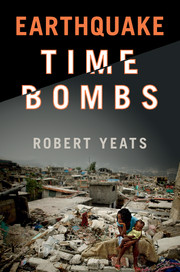Book contents
- Frontmatter
- Contents
- Acknowledgments
- Why this book?
- PART I EARTHQUAKES, DEEP TIME, AND THE POPULATION EXPLOSION
- PART II EARTHQUAKE TIME BOMBS
- TIME BOMBS WHERE THE PROBLEM IS UNDERSTOOD, BUT THE RESPONSE IS STILL INADEQUATE
- OTHER TIME BOMBS, INCLUDING CITIES THAT ARE NOT WELL PREPARED
- 13 Age of Enlightenment and the 1755 Lisbon earthquake
- 14 Jerusalem: earthquakes in the Holy Land
- 15 Istanbul: responding to an official earthquake warning
- 16 Tehran: the next earthquake in the Islamic Republic of Iran?
- 17 Kabul: decades of war and Babur's warning
- 18 Earthquakes in the Himalaya
- 19 Myanmar and the Sagaing fault
- 20 Metro Manila, the Philippines
- 21 Lima, Peru: Inca earthquake-resistant construction and a bogus American earthquake prediction
- 22 Andean earthquakes in Quito and Guayaquil, Ecuador
- 23 Caracas: lots of oil, but little interest in earthquakes
- 24 Haiti, which lost its gamble, and Jamaica and Cuba (not yet)
- 25 Mexico City: bowl of jello inherited from the Aztecs
- 26 Central America and the earthquake that brought down a dictator
- 27 East African Rift Valley: a tale of two cities
- PART III SUMMARY AND RECOMMENDATIONS
- References
- Index
23 - Caracas: lots of oil, but little interest in earthquakes
from OTHER TIME BOMBS, INCLUDING CITIES THAT ARE NOT WELL PREPARED
Published online by Cambridge University Press: 05 November 2015
- Frontmatter
- Contents
- Acknowledgments
- Why this book?
- PART I EARTHQUAKES, DEEP TIME, AND THE POPULATION EXPLOSION
- PART II EARTHQUAKE TIME BOMBS
- TIME BOMBS WHERE THE PROBLEM IS UNDERSTOOD, BUT THE RESPONSE IS STILL INADEQUATE
- OTHER TIME BOMBS, INCLUDING CITIES THAT ARE NOT WELL PREPARED
- 13 Age of Enlightenment and the 1755 Lisbon earthquake
- 14 Jerusalem: earthquakes in the Holy Land
- 15 Istanbul: responding to an official earthquake warning
- 16 Tehran: the next earthquake in the Islamic Republic of Iran?
- 17 Kabul: decades of war and Babur's warning
- 18 Earthquakes in the Himalaya
- 19 Myanmar and the Sagaing fault
- 20 Metro Manila, the Philippines
- 21 Lima, Peru: Inca earthquake-resistant construction and a bogus American earthquake prediction
- 22 Andean earthquakes in Quito and Guayaquil, Ecuador
- 23 Caracas: lots of oil, but little interest in earthquakes
- 24 Haiti, which lost its gamble, and Jamaica and Cuba (not yet)
- 25 Mexico City: bowl of jello inherited from the Aztecs
- 26 Central America and the earthquake that brought down a dictator
- 27 East African Rift Valley: a tale of two cities
- PART III SUMMARY AND RECOMMENDATIONS
- References
- Index
Summary
HISTORICAL BACKGROUND
The capital of Venezuela is in some respects a modern, wealthy city, in part due to the availability of petrodollars. Venezuela has the largest oil reserves in Latin America, and its reserves are in the top ten worldwide. The country exports a large amount of its oil to the United States, despite their political differences. Oil provides one-third of Venezuela's gross national product and 50% of income to run the national government. The recent drop in the price of oil has had a major impact on the Venezuelan economy.
The city of Santiago de León de Caracas was founded by the Spanish in 1567 and became the capital of the Province of Venezuela in 1577. The city occupies a mountain valley and is separated from the coast by a mountain range, the Cordillera de la Costa, as high as 7400 feet (Figure 23.1). The reason Caracas was not located on the nearby Caribbean coast was the fear of attack by English fleets or by pirates; the Cordillera de la Costa served as a wall against invasion. Nevertheless, pirates breached the mountain wall and burned the city in 1595.
On June 11, 1641, Caracas was destroyed by the St. Barnabas Day earthquake at a time when it had only a small population. Five hundred people were killed. There was a proposal to move the capital to a safer place, but this plan was abandoned when it was not supported by the Spanish authorities.
The successes of the American and French revolutions led to a desire by Venezuelans to be free of Spanish rule. The first revolution was put down by the Spanish in 1797. The revolution that was ultimately successful began under the leadership of Venezuela's George Washington: Simón Bolívar, known as El Libertador, when he declared Venezuela's independence in 1811.
THE 1812 EARTHQUAKES
On March 26, 1812, the year after Venezuela declared its independence from Spain, disaster struck. Caracas was destroyed by an earthquake of magnitude 7.7 to 8, much larger than the previous earthquake of 1641. There were two shocks separated by nearly 45 minutes. The first destroyed Caracas, and the second destroyed the city of Mérida, in the Andes Mountains in the far western part of the country (Figure 23.1). Several other cities were also destroyed, including Barquisimeto, northeast of Mérida, and La Guaira, the port city for Caracas.
- Type
- Chapter
- Information
- Earthquake Time Bombs , pp. 270 - 277Publisher: Cambridge University PressPrint publication year: 2015



